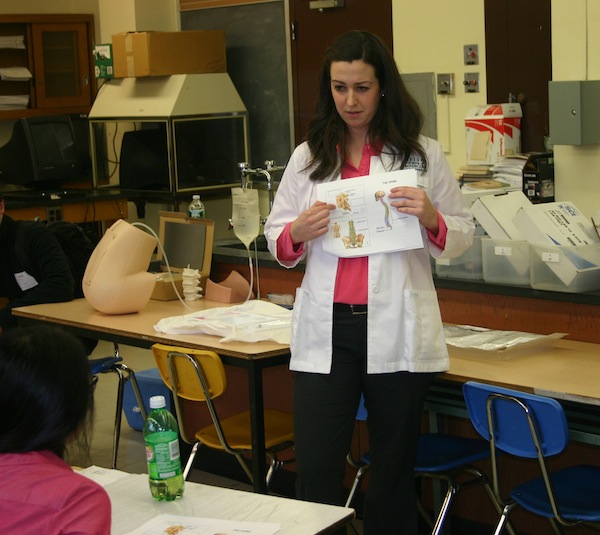Manchester High School Program

Objective: to help students understand the grief cycle, as well as empower them to help friends or loved ones going through periods of bereavement. This curriculum was developed by Devang Sharma (UHS member and Geisel '14) and Emily Carson (Geisel '15). It was our personal experience that kids in high school often have their first encounters with loss and grief, yet there is usually no formal format during which these sorts of feelings are discussed. In particular, many kids in urban neighborhoods experience great deals of adversity and loss that is often not addressed in their educational curricula. The Urban Health Scholars have been lucky enough to work with Chris Bouchard, one of the health teachers at Manchester Central High School, who has helped us develop a curriculum that meets the needs of her students and is incorporated into the health classes that she teaches.
The MCHS students: During each trip to Manchester, two UH scholars attend a day's worth of health classes (a mandatory class for students attending Manchester Central High School). Each class consists of about 30 students, ranging from sophomores to seniors. The curriculum is comprised of 3 or 4 sessions (depending on scheduling), and we arrange the program so that we work with the same students across all sessions. We have been blown away by some of the amazing experiences that the students have shared with us, and the courage and perseverance they have shown in the face of adversity.
The curriculum: During the first session, the UH scholars outline the program's objectives and discuss how various aspects of the "wellness wheel" (physical, emotional, social, intellectual, spiritual, and environmental components) contribute to overall health. Students then brainstorm different types of losses that might cause an individual to feel grief, and how each of those losses would affect various aspects of the wellness wheel.
In the second session, the scholars and students discuss the grief cycle and how it might look different for different individuals. In the third session, we discuss "red flags" during the grieving process that might signal an individual's need for additional help through the process of bereavement. Finally, the students read mock case studies of high school students dealing with grief, and come up with a support plan that they could institute in each case.
Keeping the program sustainable: Each year, a second year UH scholar and a first year scholar work together to fine-tune the curriculum and teach the courses. As a result, there is always someone teaching the course who has done it before and who can ensure that the program is successfully handed off to the subsequent class of scholars. In addition, the MCHS students complete surveys at the completion of the program so that we are annually refining the curriculum based on student feedback.